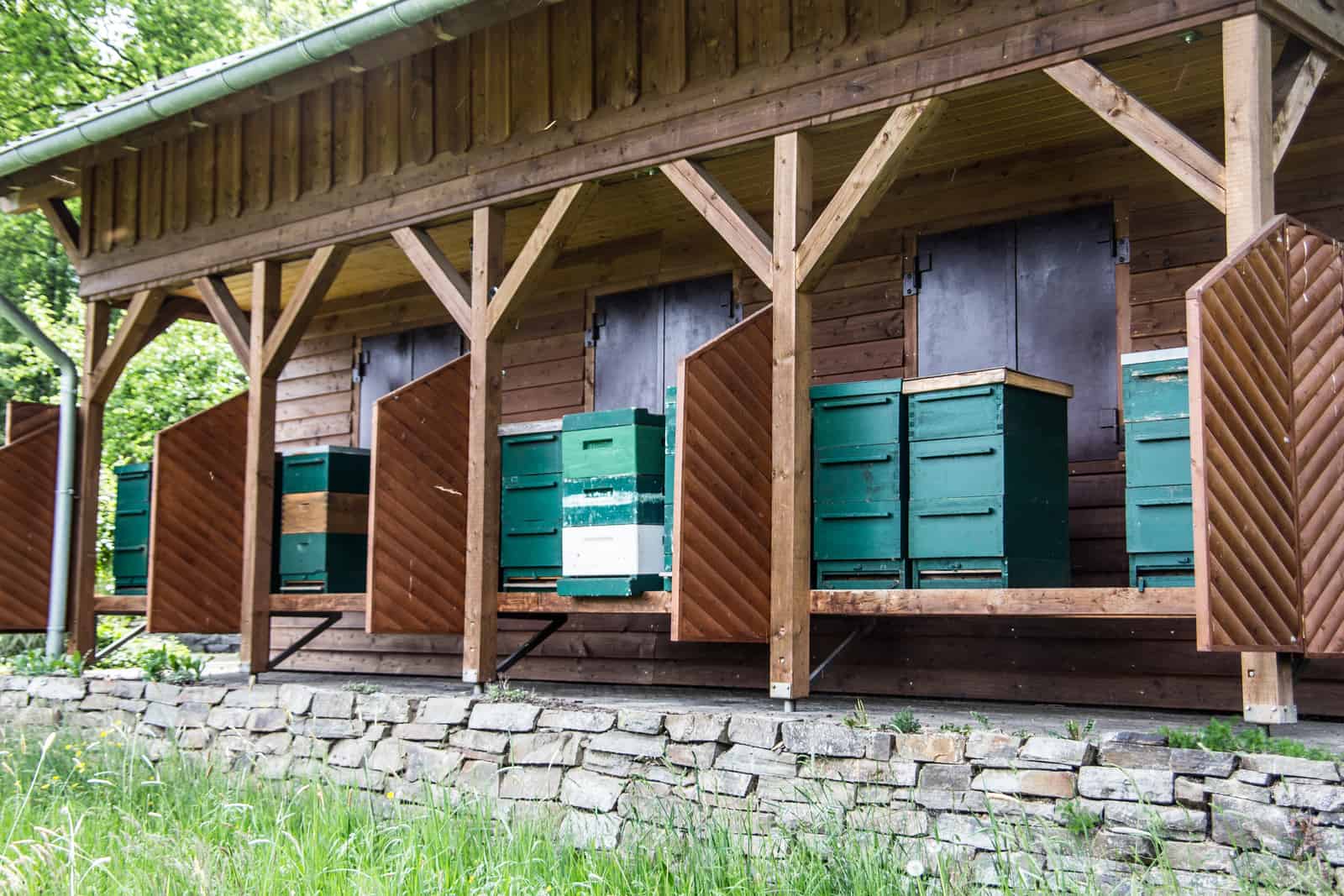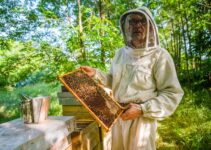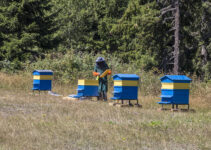Beekeeping requires both book learning and practical experience to become a successful beekeeper. One way to gain the practical experience component is to sign up for an apprenticeship with a beekeeper. How does a beekeeping apprenticeship work, and how do you apply to be an apprentice?
A beekeeping apprenticeship is learning the practical aspects of beekeeping on the job and being paid a wage or a salary while you learn. Commercial beekeepers are the best way to find an apprenticeship position. Make contact with commercial beekeepers through the local beekeepers association.
Practical experience gained from an experienced beekeeper can be invaluable to building your knowledge about practical beekeeping to the point where you can manage your own apiary successfully. Becoming a beekeeping apprentice is a good way to gain this knowledge, but where do you start looking to get an apprenticeship in this field?
How Does A Beekeeping Apprenticeship Work?
Many jobs that involve working in a practical environment and adjusting techniques and methods to cater to changing conditions require more than studying the science behind the job.
Beekeeping falls very much into this category. You can learn a lot about keeping bees from books and studying, but there is no replacement for practical in-the-field experience.
Beekeepers will often be confronted with situations that are not documented in textbooks, but your understanding of the science behind beekeeping, combined with practical regional knowledge, will help you solve these problems.
An apprenticeship with an experienced beekeeper is a valuable opportunity to fast-track your experience and master the craft of beekeeping.
What Is A Beekeeping Apprenticeship?
Two of the main methods of gaining experience from other beekeepers are undertaking an apprenticeship or an internship with a beekeeper.
What is a beekeeping apprenticeship, and how does it differ from an internship? An apprenticeship has a longer time commitment, you receive compensation for your work, and it includes a systematic approach to learning the key aspects of beekeeping.
In contrast, an internship is of shorter duration, generally without remuneration, and the experienced beekeeper teaches whatever tasks he or she is busy with at the time. For a more in-depth discussion about beekeeping internships, take a look at our article “What Is A Beekeeping Internship + How To Get On One?”
An apprenticeship is generally a commitment that requires full-day work for the beekeeper, as if you were employed full-time by the beekeeper, while an internship can be accomplished in sporadic attendance for specific beekeeping activities.
A beekeeping apprenticeship will give a more thorough, in-depth look at the practical aspects of beekeeping, and you will come out of the apprenticeship as a competent beekeeper.
How Does A Beekeeping Apprenticeship Work?
There are different apprenticeship programs, each with its own training methods and requirements to qualify for the apprenticeship.
Some apprenticeship programs will require that the beekeeper has completed some theoretical studies in beekeeping, while others will allow you to become an apprentice while pursuing the theoretical studies.
Studying before taking up an apprenticeship is recommended, as it is difficult to work and study at the same time.
As part of the apprenticeship, you will spend time learning each aspect of practical beekeeping, with may require you to spend time in one aspect of the business at a time or learn many parts of the activity simultaneously.
What Can You Learn As A Beekeeping Apprentice?
An apprenticeship will generally take a structured approach to teach the various aspects of beekeeping. You may be required to spend time mastering one aspect of beekeeping at a time before you move on to another aspect.
For example, you may start out building beehives and nucs or cleaning and restoring old hives as the starting point of your education before going out on hive inspections.
Some programs may take a different approach, and you will perform many different beekeeping tasks throughout the day, depending on the requirements of the beekeeper.
The aspects of beekeeping you can expect to learn in a beekeeping apprenticeship are as follows.
- Beehive administration. Learning how to keep track of the beehives, their location, the condition of the colony, and the honey yield from each colony.
- Building and maintaining beehives. Many beekeepers build their own hives and make modifications to standard hive designs to suit their operation. Cleaning old hives and restoring them to good condition for production is a useful skill to learn.
- Regional nectar flows. Understanding the flora in your region and when the bees are able to collect vast resources is important for colony management and location.
- Seasonal hive maintenance. Learning the practicalities of maintaining your hives and colonies for the various seasons of the year.
- Feeding bees. This requires learning when to feed bees and what feeding substitutes are best during different seasons.
- Requeening colonies. In this beekeeping aspect, you will learn how to detect when a queen is declining in productivity or when a colony is queenless and how to fix these situations in a colony.
- Bee pest and disease control. Learning how to check your colonies for pests and diseases and the right control measures to take is important to keep your colonies healthy.
- Honey harvesting. Harvesting, processing, and bottling honey is an important beekeeping activity to learn. When to harvest, how to harvest, and harvesting methods will vary from operation to operation.
An apprenticeship generally means working every day for a beekeeper, and you will be paid a wage for your work. Your pay may increase, and you become more knowledgeable about beekeeping and master the more complex aspects of the operation.
While working for the beekeeper, you will learn the various aspects of the job and how to manage a beekeeping operation.
How Long Does A Beekeeping Apprenticeship Last?
A beekeeping apprenticeship is generally 2 to 3 years. You will need to experience an entire beekeeping cycle of at least a year to see how all the aspects of beekeeping function and fit together.
This is why a minimum of two years is recommended, rather than a single year. A single year will give you an overview of the operation, and two years will allow you to master each seasonal beekeeping activity.
Where To Find Beekeeping Apprenticeships?
Where you can find beekeeping apprenticeships will vary from region to region. Some locations have beekeeping apprenticeship programs that start every year, such as the San Francisco Bee Cause, while others only accept apprentices from time to time.
Most commercial beekeepers will only accept apprentices if they have a job opening and are looking to train a new beekeeper for the position.
Regional beekeeping associations are one of the best places to find apprenticeships local to where you live. Most beekeeping associations will have a mixed membership of hobbyists and commercial beekeepers.
Join your nearest beekeeping association and speak to the commercial beekeeping members, expressing your interest in an apprenticeship.
Some beekeeping associations offer training that they market as an apprenticeship, but this is not a true apprenticeship, but rather an apprentice beekeepers training course since you have to pay to attend the program. An example of this is the New York Beekeeping Association Apprenticeship Program.
Conclusion
A beekeeping apprenticeship is a good method of gaining practical, on-the-job training as a beekeeper while you earn a salary at the same time. Generally, the commercial beekeepers in your area are the best prospects for entering into an apprenticeship.
The best method to get to know the commercial beekeepers in your region is to join the local beekeeping association and speak to the other beekeepers in the group.
References
Writers personal experience
https://www.sfbeecause.com/apprenticeship
http://www.bees.nyc/apprenticeship
https://www.beekeepingapprentice.com/
https://astorapiaries.com/pages/apprenticeship
https://ca.indeed.com/career-advice/finding-a-job/how-to-become-a-bee-farmer




